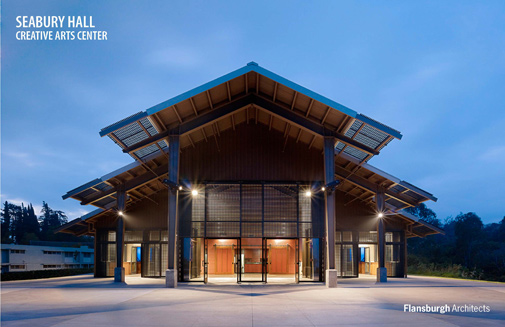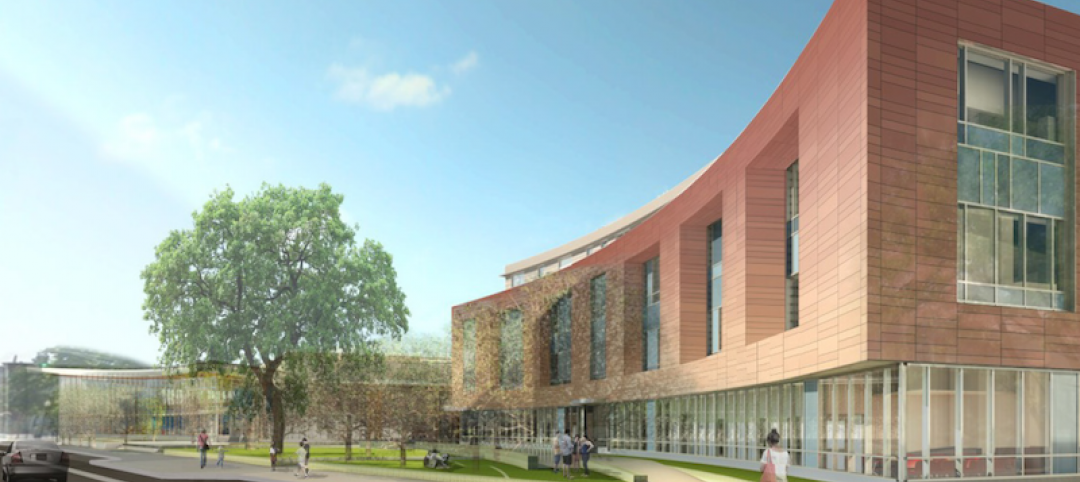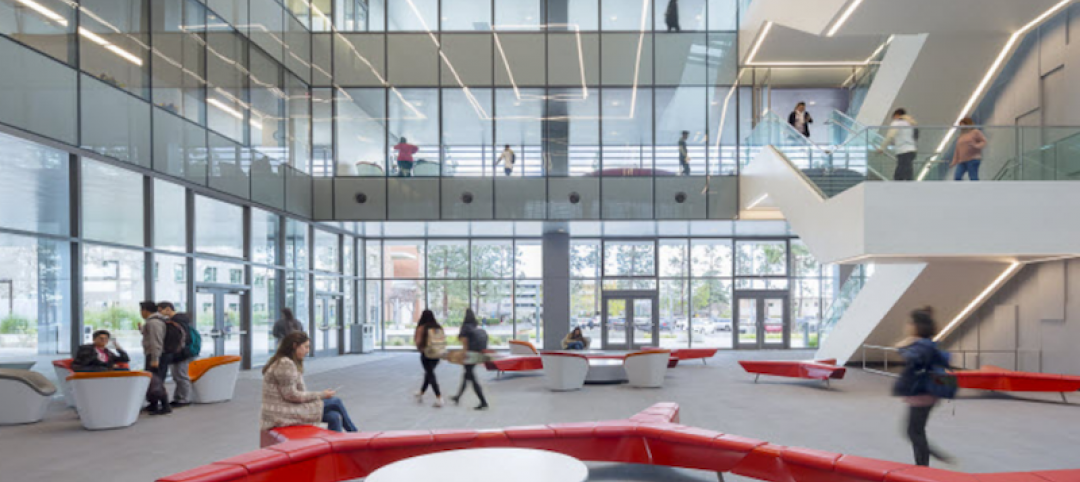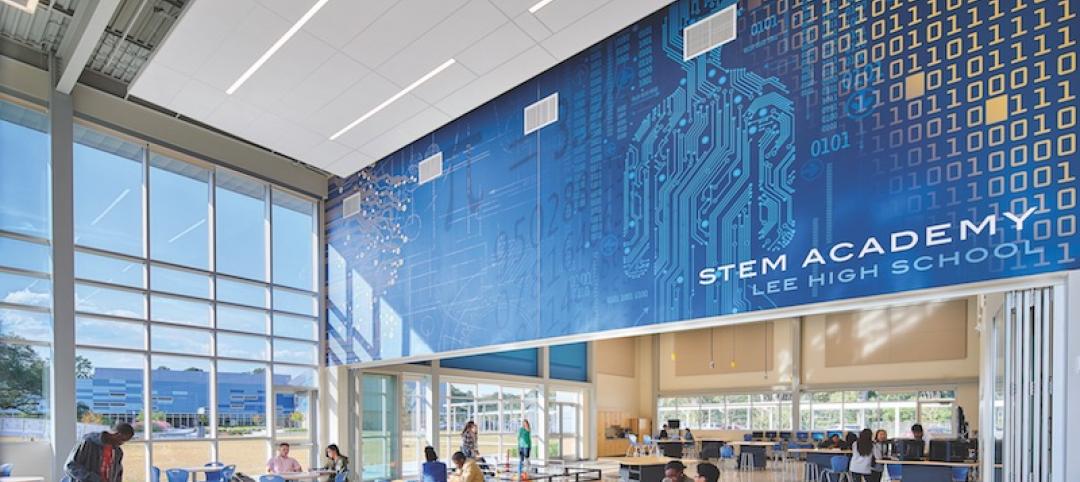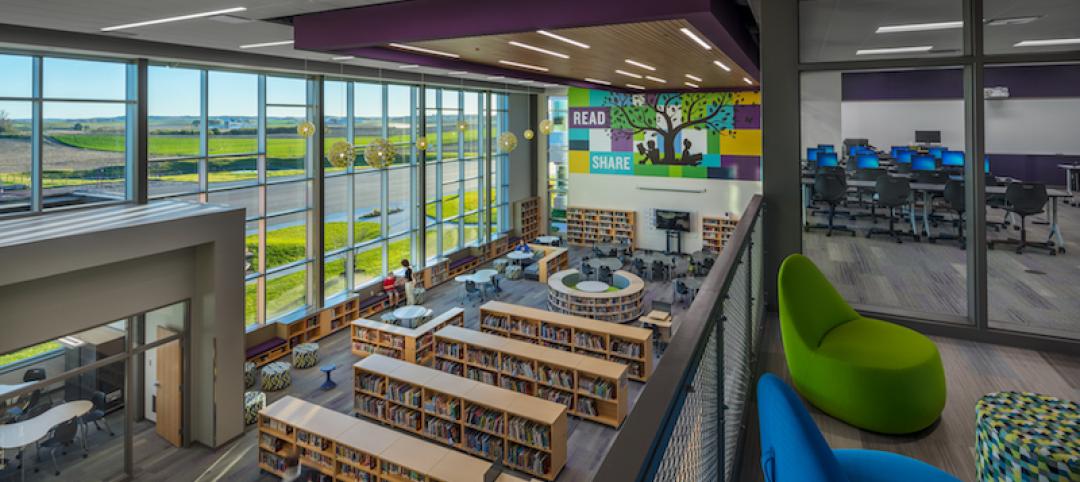Seabury Hall Creative Arts Center, a prep-school performing arts center on Maui in Hawaii, received the United States Institute for Theatre Technology's (USITT) highest architecture award—the Honor Award.
Three other venues—the SF Jazz Center, Bing Concert Hall, and Jerome Robbins Theater—received Merit Awards for 2014.
USITT's Architecture Commission presented the awards in a special session on March 28 at the USITT 2014 Annual Conference & Stage Expo in Fort Worth, Texas.
The Architecture Commission annually recognizes the best contemporary performance spaces built or renovated in recent years with Honor or Merit awards.
The Seabury Hall Creative Arts Center was designed by Flansburgh Architects, Boston, with associate architect Riecke Sunnland Kono Architects Ltd. of Kahului, Hawaii, and theatre consulting by Theatre Projects Consultants, South Norwalk, Conn.

Bing Concert Hall, Stanford University. Photo: Jeff-Goldberg/Esto
The $5.4 million arts center replaced an outdated facility with a new 500-seat theater and dance rehearsal hall on the grounds of Seabury Hall, a college preparatory school for performing arts students set on the high slopes of the Haleakala volcano on East Maui.
The architects used a steel shed structure for the theater, with wide barn doors that open the space to the natural environment overlooking the Pacific Ocean. The pre-fabricated construction of the theater and dance rehearsal pavilion kept the cost low. The project was completed in September 2012.
Two of the Merit winners are California projects—the SF Jazz Center in San Francisco and the Bing Concert Hall at Stanford University. The third is the renovation of a former rental roadhouse at the Baryshnikov Arts Center in New York into the Jerome Robbins Theater.
The $75 million Bing Concert Hall was designed by Ennead Architects, New York, with theater consulting by Fisher Dachs and acoustical consulting by Nagata Acoustics. It was constructed at a cost of $75 million as the new home to the university's music department and a venue for visiting performers serving the greater San Francisco Bay Area community.
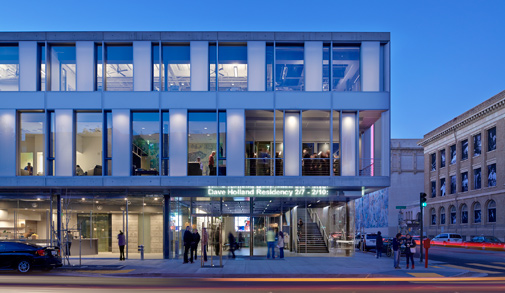
SF Jazz Center, San Francisco. Photo: Tim Griffiths
The SF Jazz Center was designed by Mark Cavagnero Associates, San Francisco, with consulting by Auerbach Pollock Friedlander and SIA Acoustics, at a cost of $32 million. It is the first freestanding venue in the United States designed especially for jazz. The three-story center is comprised of the Robert N. Miner Auditorium, which accommodates 350 to 800 seats, plus a lab, rehearsal space, box office, café, and offices.
The Jerome Robbins Theater at the Baryshnikov was formerly known as Theatre C, and is now a 299-seat, end-stage theater and main performance space completed in 2010. The architect was Wasa/Studio A, with Arup/David Taylor as theatre and acoustical consultant.
USITT's Architecture Awards are chosen based on creativity, contextual resonance, functional operation, use of new technology, and community contribution. Each project will be represented in a special exhibit at Stage Expo, where an awards reception will be held.
The adjudicators for the 2014 awards included architect Buzz Yudell of Moore Ruble Yudell Architects, theater consultant Robert Long of Theatre Consultants Collaborative, and Rick Talaske of Talaske Associates. Architecture Commission Vice-Chair William Murray oversaw the adjudication process.
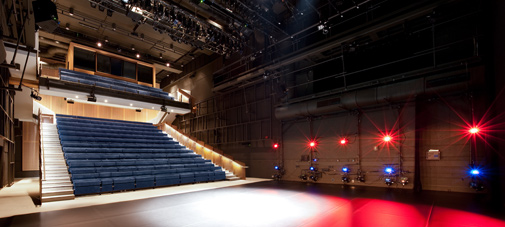
Jerome Robbins Theater, New York. Photo: courtesy JRT
Related Stories
K-12 Schools | Jan 22, 2018
Innovative learning environments and our ‘Heschong Mahone moment’
An education market think tank proposes a radical research concept for evaluating learning environments.
K-12 Schools | Dec 6, 2017
Designing K-12 schools from the inside out
A step-by-step process finds better answers, saves money, and produces measurable results.
K-12 Schools | Nov 16, 2017
Future-proofing higher education: Understanding generation Z
There are three driving issues behind this next generation: demographic change, behavioral change, and the power to choose.
Engineers | Nov 2, 2017
CannonDesign expands its presence in Colorado with BWG acquisition
Future mergers could be in the offing.
K-12 Schools | Oct 31, 2017
Exploring empathy in architecture: Put yourself in your student’s shoes
People are enigmatic and inherently complex, which can make it difficult to design for a larger population.
K-12 Schools | Oct 28, 2017
A new elementary school in Cambridge, Mass., aims at being a pilot for that city’s NZE commitment
The building’s programming will provide more access to the community at large.
Higher Education | Oct 26, 2017
Where campus meets corporate design
A building is much more than its appearance; it’s how the user will behave inside of it that determines its adaptability.
Giants 400 | Oct 9, 2017
Job-ready learning: The newest K-12 schools nudge students toward careers
Some long-term K-12 trends—like beefing up safety and security, and designing for more natural light and outdoor learning space—are still in vogue.
Giants 400 | Oct 9, 2017
Top 80 K-12 construction firms
Gilbane Building Co., Balfour Beatty US, and Skanska USA top BD+C’s ranking of the nation’s largest K-12 sector contractors and construction management firms, as reported in the 2017 Giants 300 Report.
Giants 400 | Oct 6, 2017
Top 40 K-12 engineering firms
AECOM, IMEG/KJWW/TTG, and STV top BD+C’s ranking of the nation’s largest K-12 sector engineering and EA firms, as reported in the 2017 Giants 300 Report.


